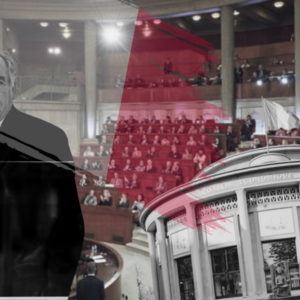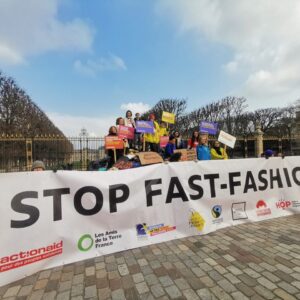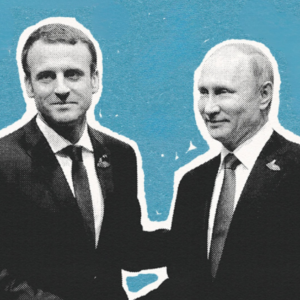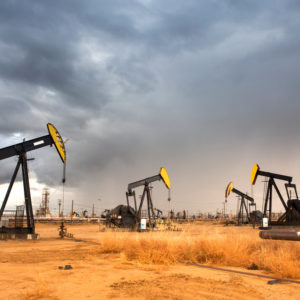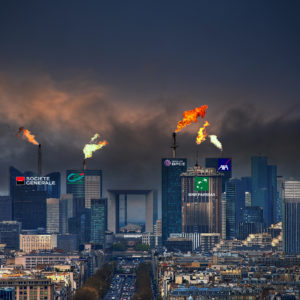European banks among biggest drivers of fossil fuel expansion
European banks have poured US$1.3 trillion into fossil fuels since the Paris Agreement carrying on financing the expansion of fossil fuels, despite their own net zero pledges. They provided US$30.3 billion to the top 100 fossil fuel developers in 2022, with French banks providing the most European money for fossil fuel expansion.
This is in particular due to their massive support to the top 9 US and European oil and gas companies including TotalEnergies, BP and Eni. Collectively they received US$11.9 billion of financing in 2022 from the French banks 2. Urgewald, ReCommon, Banktrack, Friends of the Earth France and Reclaim Finance call on European banks to stop supporting fossil fuel expansion to keep the chance of remaining below 1.5˚C alive.
Released today, the 14th annual Banking on Climate Chaos 1 report, the most comprehensive global analysis on fossil fuel banking, reveals that the world’s largest 60 private banks have poured US$5.5 trillion into fossil fuels since the adoption of the Paris Agreement.
The report lays bare the shocking fact that even as fossil fuel companies made US$4 trillion in profits in 2022, banks still provided US$673.1 billion in financing. Remarkably, this happened while oil majors like ExxonMobil and Shell asked for US$0 financing from banks in 2022.
While the largest financial flows came from the North American banks, European banks are among the biggest financiers of fossil fuels 3, providing US$130.5 billion last year, including US$30.3 billion directly to the top 100 fossil fuel developers. Sixteen global banks have even increased their financing to fossil fuels between 2021 and 2022. Among them are BNP Paribas, Crédit Agricole and Unicredit, followed by two other European banks Lloyds and CaixaBank for a limited amount of financing in 2022.
Almost all of the top 25 European banks included in the report have committed to reach net zero by 2050 following a 1.5°C scenario as signatories to the Net Zero Banking Alliance 4. Yet, most have not followed up on their pledges with robust sectoral policies 5 and keep on financing fossil developers without any conditions, 6 at odds with the International Energy Agency’s (IEA) projection of ending the development of new oil and gas fields in a 1.5ºC-aligned scenario 7.
In 2022, French banks topped the European league, providing US$15.7 billion in finance to the top 100 fossil fuel developers 8, followed by UK banks (US$4.3 billion), Spanish banks (US$3.0 billion), Italian banks (US$2.5 billion), German banks (US$2.1 billion) and Swiss banks (US$1.5 billion). The 3 main supporters of top fossil fuel developers in 2022 were Crédit Agricole (US$6.1 billion), BNP Paribas (US$5.5 billion) and Société Générale (US$3.4 billion). BNP Paribas is globally the 4th biggest supporter of fossil fuel expansion since 2016, with US$64.2 of financing to fossil fuel developers.
Lucie Pinson, Director of Reclaim Finance, declares: « The era of French leadership is over. Crédit Mutuel has watered down its commitment to stop supporting oil and gas expansion, while BNP Paribas and Crédit Agricole are among the few banks that have increased their financing for fossil fuels last year. They have provided billions to the oil and gas majors, money that is associated with human rights abuses and destined to fuel climate change. The approach that the banks have embarked on is not only doomed to failure, it is also a recipe for suffering. They must quickly match their decarbonization targets with immediate action to stop oil and gas expansion. »
The top 9 US and European oil and gas companies 9, which account for 16.2% of short-term oil and gas expansion plans globally, have received US$201.3 billion of financing from European banks since 2016. This accounts for 15.1% of their financing to the 2,039 companies covered in the report and for 51.6% of their financing to the 100 fossil fuel developers. The majority of this financing comes from French banks, which top the European league, providing US$84.2 billion in finance.
With US$45.4 billion in financing to these companies since 2016, BNP Paribas ranks first, ahead of JPMorganChase and is the biggest financier of BP (US$14.2 billion), Eni (US$10.7 billion) and Shell (US$8.1 billion). Not included in the report is BNP Paribas’ latest support of a US$2.5 billion bond insuance for BP, provided after the British major had announced weakening its greenhouse gas emissions and fossil fuel production reduction targets 10.
Crédit Agricole, whose main clients are TotalEnergies, Saudi Aramco and Eni, entered the top 10 of banks financing fossil fuel expansion in 2022. TotalEnergies, whose biggest financiers are French banks Crédit Agricole, BNP Paribas and Société Générale, has several bonds due to mature in the coming months that it could renew.
Lorette Philippot, Campaigner at Friends of the Earth France: « BNP Paribas appears once again this year as a world leader of oil and gas expansion. Despite new empty promises and weak commitments, it shows no intention of changing course and even increased in 2022 its financing of fossil fuels. 4th financier of fossil fuel developers and 1st financier of oil and gas majors in the world since 2016, BNP is even a serious competitor to North American banks in their dodgy activities. Because banking on climate chaos is totally incompatible with respecting its climate duty of vigilance, BNP Paribas shall now be held responsible in court 11.”
The German bank, Deutsche Bank, while generally providing less financial services to the fossil fuel industry in 2022, massively increased its lending to LNG companies. From 2021 to 2022 the bank almost tripled its lending from US$339.7 million to US$906.6 million. Part of this money went into the expansion of export capacities for US LNG. Dutch bank ING is in the top 5 financiers of LNG for 2022, having provided the sector with US$1.2 billion last year.
Katrin Ganswindt, Head of Finance Research at Urgewald: “To keep financing coal, oil and gas companies that still expand their dirty operations means to fuel climate destruction. Banks must drop energy companies that cannot or will not rethink their environmentally catastrophic business models. In particular, supposedly climate-conscious banks, like members of the Net-Zero Banking Alliance, need to close the fossil fuel expansionists’ money tap once and for all.”
Two UK banks feature among the top 10 financiers of expansion since 2016. Between 2016 and 2022, Barclays and HSBC poured US$55.8 billion and $US55.0 billion respectively into the expansion of fossil fuels, making them the world’s 7th and 8th expansion financiers. Both UK banks are also key financiers of particularly controversial fossil fuel sectors, with HSBC one of the top 5 banks financing Amazon oil and gas and Barclays is the world’s fourth largest financier of Arctic oil and gas 12. Barclays is the top European financier of fossil fuels since the Paris Agreement, providing US$190.6 billion since 2016.
Maaike Beenes, Campaign lead Banks and Climate at BankTrack: “Banks took an irresponsible gamble with our climate by nearly doubling their financing for fossil gas infrastructure/ LNG in the last year, and the Netherlands’ own ING was one of the worst offenders. These gas projects will not be able to address Europe’s short-term energy needs or reduce household bills – instead they will lock us into dependence on fossil fuels for decades. We need banks to stop financing fossil fuel expansion and rapidly increase their financing for cheaper renewable energy, to help keep bills down and help stop our reliance on Russian gas.”
Daniela Finamore, Finance Climate Campaigner at ReCommon: “ »Intesa Sanpaolo and UniCredit, the biggest Italian banks, have provided the fossil industry with USD 43 billion and USD 22 billion in loans and subscriptions respectively since 2016 and seem to be ignoring the warnings of the scientific community by continuing to finance the expansion of the fossil fuel industry and new business opportunities, as in the case of LNG. Profits are being made to the detriment of local communities who are already suffering the worst impacts of climate change. »
This is what the Banking on Climate Chaos: Fossil Fuel Finance Report 2023 reveals. It is the most comprehensive analysis of banks’ fossil fuel financing in production. It is authored by Rainforest Action Network, BankTrack, Indigenous Environmental Network, Oil Change International, Reclaim Finance, Sierra Club, and Urgewald and endorsed by over 550 organizations from more than 71 countries.
The top 100 fossil fuel developers include primarily upstream oil and gas companies, as well as midstream companies, coal mining and coal power companies, selected for their exploration and expansion activities. See methodology for more details.
North American banks represented 48% of total fossil fuel financing from 2016. European banks represented 24% of total fossil fuel financing from 2016.
Except DZ Bank, all European banks joined the Glasgow Financial Alliance for Net Zero (GFANZ) The GFANZ was launched in April 2021. It is “committed to accelerating and mainstreaming the decarbonization of the world economy and reaching net zero emissions by 2050.” GFANZ’s seven sectoral alliances represent asset owners and managers, banks, and insurers, as well as financial consultants and providers of data and other financial services. These alliances have more than 550 members from 50 countries including many of the world’s most powerful financial institutions.
See the evaluation of the sectoral policies on the Coal Policy Tool and Oil & Gas Policy Tracker. All six French banks in scope of the report (BNP Paribas, Société Générale, Crédit Agricole, BPCE/Natixis, Crédit Mutuel, La Banque Postale) have coal/oil and gas sectoral policies; two (La Banque Postale and Crédit Mutuel) have robust policies against coal developers, and only one (La Banque Postale) has a robust policy against oil and gas developers. So far, despite its low exposure to the oil and gas sector, Crédit Mutuel has failed to firmly tackle oil and gas expansion in its sectoral commitments, as promised in 2021.
The leading banks, asset owners and managers of the seven sectoral alliances that make up GFANZ are continuing to pour hundreds of billions of dollars into the expansion of the coal, oil and fossil gas industries. See the report Throwing Fuel On The Fire : GFANZ financing of fossil fuel expansion, January 2023.
Reclaim Finance, WEO 2022 – From the fossil fuel age to the clean energy era, November 2022.
The majors that received the most support from the 4 French banks from 2016 to 2022 are TotalEnergies: US$23.9 billion, BP: US$21.1 billion, Eni: US$16.9 billion, Shell: US$9.7 billion and Exxon: US$6.6 billion.
The top 9 oil and gas companies based on international oil and gas companies’ production in 2021 are: BP, Eni, Equinor, Repsol, Shell, TotalEnergies, Chevron, ConocoPhillips, ExxonMobil. Source : Global Oil & Gas Exit List
BNP Paribas’ participation in this bond issuance happened even though the French bank had announced it would reduce its outstanding financing for oil extraction and production by 80% by 2030. A weak and insufficient commitment, which in particular does not cover underwriting activities. Reclaim Finance, BNP Paribas’ new oil and gas measures take wrong approach, January 2023.
Friends of the Earth France, Notre Affaire à Tous and Oxfam France, who had BNP Paribas formal notice to comply with its due diligence obligations in October 2023, sued BNP Paribas over its massive support to fossil fuel expansion in February 2023. Friends of the Earth France, Notre Affaire à Tous and Oxfam France, French NGOs take BNP Paribas to court in world’s first climate lawsuit against a commercial bank, February 2023.
HSBC one of the top 5 banks financing Amazon oil & gas, providing US$ 917 million since 2016 and Barclays has provided US$1.9 billion for Arctic oil and gas since 2016.

